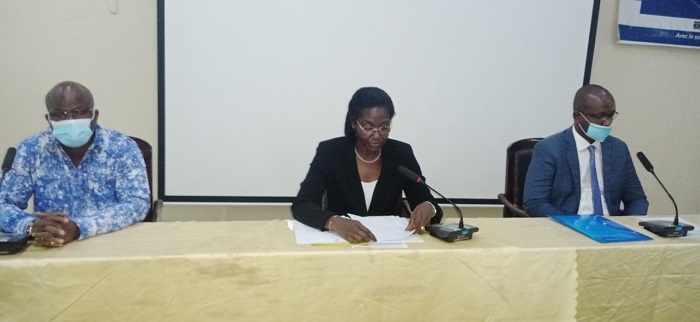The Minister in charge of Justice, Victoria Ouédraogo / Kibora, opened the workshop on the diagnosis of the problem of processing criminal cases. Organized by the said ministry, this Tuesday, June 1, 2021 in Koudougou (Center-Ouest), this exchange meeting aimed to identify the root causes of the accumulation of cases and to propose solutions. This activity took place thanks to the support of the International Development Law Organization (IDLO) and the Embassy of the Kingdom of the Netherlands in Burkina Faso.
It is in the presence of magistrates, clerks, prison administration and finance staff as well as technical and financial partners from the justice and human rights sector that the work of the workshop started today. Tuesday, June 1, 2021. Scheduled to be held from June 1 to 2, 2021, the activity aims in a concrete way to first identify the root causes of the delays in the processing of criminal cases which cause the constitution of stocks. The second step is to propose solutions in the form of strong recommendations with a view to significantly reducing the delays observed in the processing of these files.
- Victoria Ouédraogo / Kibora, Minister in charge of Justice, Keeper of the Seals
As a reminder, the judicial system had been strongly criticized for its slowness in the processing of criminal cases and its inability to effectively protect rights and freedoms, following a diagnosis carried out in 2015 under the regime of the transition in the framework of the States General of Justice. Also, the diagnosis made during the development of the justice and human rights sector policy for the period 2018-2027, also revealed that this slowness is significant in the processing of complex criminal or tort cases for which referral orders to the criminal chambers of the courts of appeal or the correctional chambers of the TGI have been made.
Taking this situation into account, several actions have been taken. These include, among other things, the adoption of Law No. 041-2017 / AN of June 29, 2017 on the functioning and applicable procedure before the criminal chamber, now incorporated into the Code of Criminal Procedure in order to allow rapid processing and progressive evacuation of files. However, today, it is common ground that the cases awaiting judgment before the criminal chambers of the courts of appeal continue to accumulate, which continues to fuel a crisis of confidence among litigants with regard to justice. Hence the need to hold this framework for reflection on the diagnosis of the problematic of processing cases awaiting judgment before the criminal chambers of the courts of appeal. This activity was organized by the General Directorate of Criminal Justice and the Seal of the Ministry of Justice, with the technical and financial support of the International Development Law Organization (IDLO).

- Participants are among others magistrates, clerks, prison administration and finance staff
Criminal justice that is more accessible, understandable, rapid …
The opening ceremony, chaired by Victoria Ouédraogo / Kibora, Minister of Justice, Human Rights and Civic Promotion, Keeper of the Seals, was an opportunity for her to stress that the organization of this workshop is the taking into account a concern that has been recalled many times during formal and informal meetings bringing together actors in the criminal justice chain. To do this, she hoped that the discussions would focus on the functioning of the penal chain in its aspect of processing criminal cases in order to identify the obstacles, the sources of dysfunction and confusion in the relations between the actors involved. in the procedure for handling this type of case, and formulate recommendations with a view to remedying the shortcomings. “It is necessary that, if there are problems, we arrive together to detect these problems, know what the bottlenecks are and that together we manage to find solutions so that criminal cases are processed in real time” , she indicated the way forward.

- Patrick Ndikumana, country representative of the International Development Law Organization in Burkina Faso (IDLO)
Aware of the realities which are essential, the Minister specifies that it is more than necessary to continue the reflections in order to have a more accessible, understandable, rapid and equal criminal justice for all. As a result, she reassures the relentless commitment of her department to hold consultations for reforms to adapt criminal justice to our time and to our national context.
While welcoming the dynamic initiated by the three courts of appeal for the organization of criminal sessions in their respective jurisdictions, it nurtures the hope that thanks to this synergy, the same pace will be maintained or even amplified so that the maximum number of cases be judged as soon as possible.

Improve processing times for criminal cases
For Patrick Ndikumana, country representative of the International Development Law Organization (IDLO) in Burkina Faso, this activity comes into play with the general objective of the IDLO Sahel program, which is to make criminal justice more effective. accessible, more respectful of human rights, faster, more transparent, more accountable and more focused on the needs of populations.
According to him, this reflection could help to considerably reduce the processing times of cases before the criminal chambers of the courts of appeal. He also adds that the workshop is of capital importance for the courts because on the one hand it will make it possible to respond to the populations’ demand for justice and on the other hand to improve the perception of justice by the beneficiaries.
“This is a very important activity not only for IDLO but also for all the technical and financial partners who provide support to the justice sector. We hope that through this workshop, recommendations will emerge that will improve the processing of criminal cases and make justice more accountable for the benefit of beneficiaries, ”he said.
Prince Omar
LeFaso.net
–


